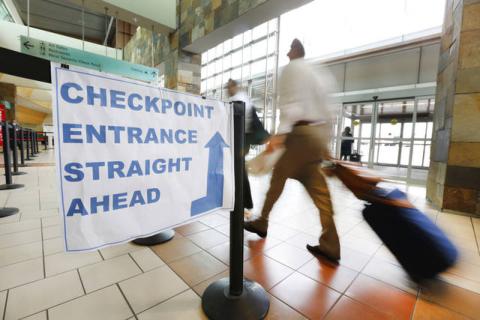 |
Canku Ota
|
 |
|
(Many Paths)
|
||
|
An Online Newsletter
Celebrating Native America
|
||
|
March 2018 - Volume
16 Number 3
|
||
|
|
||
|
Federal Lawsuit Forces
Oklahoma City Airport Security To Modify Their Handling Of Native
American Objects
|
||
|
by Justin Wingerter
- NewsOK
|
||
Security officials at Will Rogers World Airport will soon modify the way they handle sacred Native American objects following a federal lawsuit. Transportation Security Administration agents at the Oklahoma City airport must avoid touching religious objects whenever possible and must place them in bins without other items, under guidelines set to go into effect by late March. The change follows a lawsuit by the Native American Church of North America — which was founded in Oklahoma but is now based in South Dakota — and an incident in 2015 involving its former president, Sandor Iron Rope. As he prepared to board a flight at San Antonio International Airport, Iron Rope carried with him instruments sacred to his religion: a gourd rattle, a staff, an eagle feather, an eagle-bone whistle and a feather fan. Members of the Native American Church believe spiritual energy is preserved within certain religious items and may only be handled by followers of that faith. When handled by those outside their faith, the spiritual energy within the items can be lost or polluted. According to a lawsuit filed last February, Iron Rope informed TSA agents of the fragile relics in his carry-on bag and asked that agents not handle them. The agents ignored this request "and proceeded to physically touch and roughly handle" the objects. Iron Rope filed the lawsuit, claiming his First Amendment right to practice his religion was violated, along with his Fourth Amendment protection from unreasonable search and seizure and Fifth Amendment right to equal protection under the law. Last month, Iron Rope and the Native American Church reached a settlement with the TSA. Under the agreement, TSA officials at Will Rogers and four other American airports will follow the new guidelines. 'Whole lot better' Eugene Blackbear Jr., a member of the Cheyenne and Arapaho Tribes and Native American Church, flies out of Will Rogers often with sacred objects in his peyote box, a wooden container used by adherents of the Native American faith for the transportation of relics. "It will be a whole lot better if the TSA person just asks the Native American Church member, 'Can you please open your box and show me your items?'" Blackbear said. "They can just look at them. They don't even need to touch them." Blackbear, an acquaintance of Iron Rope, compares the handling of church relics by TSA to invasions of privacy. "How would you like it if I just walked into your house and sat down and helped myself to your icebox and turned the TV on? It's like that," he said. Blackbear has had only one negative experience at Will Rogers World Airport, he said, and it was resolved before any sacred objects were touched. He said TSA agents in Oklahoma City typically know what a peyote box is and decline to question him about its contents. Agents need to learn about Native American Church practices, he said, and Blackbear has volunteered to host an orientation at the airport. The legal settlement requires the TSA to produce a video with Iron Rope and church members that will explain the new guidelines. It will be shown to TSA employees at 10 airports. "TSA will abide by the terms and timeline of the settlement agreement," said Carrie Harmon, an agency spokeswoman. "TSA respects the rights of all passengers during the security screening process," she added. "If a passenger has religious, cultural or ceremonial items that require special handling, please inform the TSA officer prior to the screening of those items." The new guidelines instruct TSA agents to "not challenge or question the sincerity of a traveler's professed religious beliefs" or "contact law enforcement to investigate lawful peyote possession or transportation by followers of Native American religions." The church won the legal right to use peyote, a controlled substance, in 1978. In 1990, the U.S. Supreme Court ruled states can deny unemployment benefits to Native American Church members who are fired for violating state prohibitions on peyote. Forrest Tahdooahnippah, the lead attorney for Iron Rope, said he expects more church members will fly, rather than drive, to their destination due to the lawsuit and settlement. "The fear of a negative experience was a deterrent to travel," he said. Blackbear agreed, saying, "I think a lot of them didn't travel because of this. |
||
|
|
|
|
||
|
|
||
| Canku Ota is a free Newsletter celebrating Native America, its traditions and accomplishments . We do not provide subscriber or visitor names to anyone. Some articles presented in Canku Ota may contain copyright material. We have received appropriate permissions for republishing any articles. Material appearing here is distributed without profit or monetary gain to those who have expressed an interest. This is in accordance with Title 17 U.S.C. Section 107. | ||
|
Canku Ota is a copyright ©
2000 - 2018 of Vicki Williams Barry and Paul Barry.
|
||
 |
 |
|
|
The "Canku
Ota - A Newsletter Celebrating Native America" web site and
its design is the
|
||
|
Copyright ©
1999 - 2018 of Paul C. Barry.
|
||
|
All Rights Reserved.
|
||
